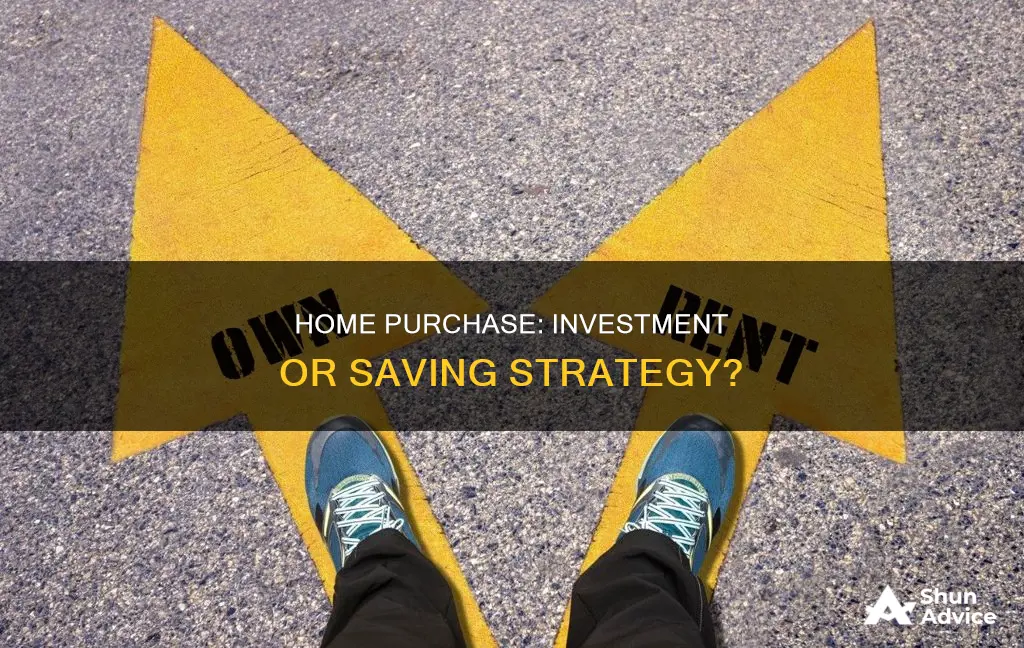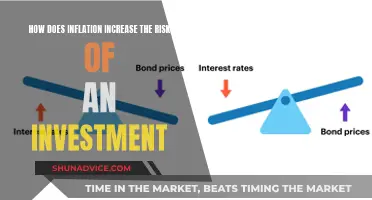
There are many factors to consider when deciding whether buying a house is a good investment or a savings plan. On the one hand, homeownership is often seen as a key milestone and an important part of the American Dream. It can lead to greater financial stability and wealth-building over time. However, it's important to remember that the housing market has its ups and downs, and there are also risks and costs associated with buying a home. These include high acquisition costs, the possibility of depreciation, and ongoing maintenance expenses. So, while buying a house can be a good investment for some, it's essential to carefully consider your financial situation, the current state of the housing market, and your short- and long-term goals before making any decisions.
| Characteristics | Values |
|---|---|
| Appreciation | The value of a home typically increases over time, but this is not guaranteed. |
| Equity Building | Homeownership helps build equity as you pay off your mortgage. |
| Tax Benefits | Tax deductions are available for mortgage interest and property tax payments. |
| Rental Income | A home can be a source of rental income. |
| Financial Stability | Homeownership is associated with greater financial stability. |
| Lifestyle Benefits | Homeownership provides more space and freedom to decorate or make changes to the property. |
| Closing Costs | Closing costs can range from 2% to more than 6% of the purchase price. |
| Maintenance Costs | Maintenance costs can be expensive, averaging 1%-4% of the home's total value annually. |
| Depreciation | Homes can depreciate in value, especially during economic downturns. |
| Timing the Market | It can be challenging to time the market to maximize profit from the sale of a home. |
What You'll Learn

The pros of buying a home
Long-term Appreciation and Equity
The value of your home will likely grow over the long term, and you can sell it for a substantial return on your investment. This is because the demand for housing usually outpaces supply, keeping home values elevated. You can also build equity as you pay off your mortgage, which can be a source of emergency funding.
Savings on Rent
Renting is spending money on something that will never be yours, whereas a mortgage means you are working towards owning an asset that can increase in value over time.
Financial Stability
Homeownership is often linked to greater financial stability. On average, homeowners have a much higher net worth than renters. This is partly because homeowners build equity and can also tap into this as a source of cash if needed.
Tax Benefits
There are tax benefits to owning a home. For example, in some places, you can deduct mortgage interest and property tax payments on your taxes every year.
Lifestyle Benefits
Homeowners often have more space than renters, which may be preferable for raising a family. Additionally, when you own your home, you have more control over decorating and making changes, such as adding solar panels.
Yotta Savings: A Smart Investment Strategy for Your Money
You may want to see also

The cons of buying a home
While buying a home can be a good investment, there are several reasons why it may not be the best decision for everyone. Here are some of the potential downsides to consider:
High Acquisition Costs
The cost of buying a home includes more than just the purchase price. There are also closing costs, which can range from 3% to 6% of the total price of the home. Additionally, mortgage interest rates can be steep, lowering your buying power and making homeownership more expensive.
Appreciation is Not Guaranteed
While homes have generally appreciated in value over time, it is important to remember that appreciation is not a sure thing. The value of homes can depend on the overall economy of the area, and there is always the risk of a market downturn or other economic factors that could impact home values.
Increased Homeownership Costs
Even with a fixed-rate mortgage, other associated homeownership costs are likely to increase over time. These include property taxes, maintenance expenses, insurance premiums, and HOA fees, if applicable. These costs can add up quickly and put a strain on your finances.
Reduced Flexibility
Homeownership can tie up a significant portion of your money, reducing your liquidity and the amount of cash you have available for other needs or emergencies. Additionally, selling a home is not as simple as ending a lease, so it can be more challenging to relocate as a homeowner.
Maintenance and Repairs
Maintaining a home can be costly and time-consuming. On average, homeowners can expect to pay 1% to 4% of the home's total value on routine maintenance each year. This does not include the cost of any major repairs or unexpected issues that may arise.
Timing the Market can be Difficult
Maximizing your profit when selling a home requires purchasing in a buyer's market and selling in a seller's market. However, it can be tricky to time the market correctly, and many people fail to maximize their profit as a result.
Savings or Investing: Where Should Your Money Go?
You may want to see also

The costs of buying a home
Purchasing a home comes with a multitude of costs, some of which are one-off payments, while others are ongoing expenses. Here is a breakdown of the costs you can expect when buying a home:
Down Payment
A down payment is the money paid upfront when buying a home. It is typically a percentage of the property's value, with most lenders recommending a down payment of 20% or more. However, it can be as low as 3% for a conventional mortgage and 0% for a VA loan. The down payment amount will depend on your financial situation and the lender's requirements.
Closing Costs
In addition to the down payment, you will also need to cover closing costs, which include fees for loan application, origination costs, appraisal, inspection, and attorney fees. These costs can range between 3% and 6% of the property's purchase price and are paid separately from the down payment.
Homeowners Insurance
Lenders usually require homeowners to have insurance to protect their investment. The cost of homeowners insurance varies depending on the location and coverage type but averages about $1,200 per year.
Monthly Mortgage Payment
Most homebuyers borrow a significant portion of the purchase price from a mortgage lender. The monthly mortgage payment includes principal and interest components and is determined by the loan balance and interest rate.
Home Maintenance and Repairs
As a homeowner, you will be responsible for maintaining the property, which can be costly. Maintenance costs can vary depending on the home's condition, with newer homes typically requiring about 1% of the home's value annually in maintenance, while older homes may need up to 4% or more.
Property Taxes
Property taxes are assessed by the county and are used to fund local services and infrastructure. The amount of property tax varies by state and is determined by state tax laws and the property's assessed value.
HOA Fees
If you buy a home in a community with a homeowners association (HOA), you will need to pay monthly HOA fees. These fees cover the maintenance and insurance of shared spaces within the community and can range from $100 to several thousand dollars per month.
It is important to carefully consider all these costs when deciding to buy a home. While homeownership can provide stability and the opportunity to build wealth, it is a significant financial commitment that requires careful planning and management.
Investing Young: Better Than Saving?
You may want to see also

The financial benefits of buying a home
Long-term Appreciation and Equity
The value of your home typically rises over time, and as you pay off your mortgage, you build equity. This can lead to a substantial return on your investment when you sell. Historical data shows that home prices have increased significantly over the years, with the median home sale price in the US rising from $221,800 in 2010 to $425,150 in 2023.
Savings on Rent
Owning a home means you're no longer spending money on rent, which is unrecoverable. Instead, your mortgage payments go towards fully owning a tangible asset that can increase in value over time.
Greater Financial Stability and Net Worth
Homeownership is often associated with greater financial stability and a higher net worth compared to renting. According to data from the National Association of REALTORSⓇ Research Group, homeowners have an average net worth of $300,000, which is 37.5 times higher than the net worth of renters at $8,000. Homeownership helps build wealth through equity and appreciation.
Tax Benefits
There are certain tax advantages that come with owning a home. You can deduct mortgage interest and property tax payments on your taxes each year if you itemize your deductions. These deductions can result in significant savings, especially for those in higher tax brackets.
Rental Income and Cash Flow
Owning a home provides the opportunity to generate rental income, either by renting out a portion of your home or the entire property. This can help offset the costs of homeownership, increase your cash flow, and build wealth over time.
529 Savings Plans: Smart Investment Strategies, per Forbes
You may want to see also

The financial drawbacks of buying a home
While buying a home can be a good investment, it is not always the case. There are several financial drawbacks to consider before taking the plunge into homeownership.
High Acquisition Costs
The cost of buying a home includes more than just the purchase price. There are also closing costs, which can range from 2% to over 6% of the total price of the home. For example, on a $250,000 home, closing costs could be anywhere from $5,000 to $15,000. These costs must be factored into the overall budget for the home, and can add a significant amount to the final price.
Ongoing Maintenance and Repair Costs
Once you own a home, you are responsible for all maintenance and repairs. On average, homeowners spend about 1-4% of the home's total value on routine maintenance each year. For a $250,000 home, that equates to $2,500-$10,000 per year. These costs can be unpredictable and vary greatly depending on the condition and age of the home.
Lack of Liquidity
When you buy a home, a large portion of your wealth becomes tied up in that asset, reducing your liquidity. This can impact your ability to invest in other opportunities or access cash in the event of an emergency.
Potential for Depreciation
While homes generally appreciate in value over time, there is also a risk of depreciation. This can be due to a variety of factors, such as a decline in the local economy or a decrease in demand for housing in the area. External factors, such as a pandemic or an economic crisis, can also cause housing prices to drop.
Loss of Flexibility
Homeownership can reduce your flexibility and make it more difficult to relocate. The process of selling a home can be time-consuming and costly, involving realtor fees and other expenses. If you are someone who values the freedom to move around, renting may be a better option as it allows for more flexibility and less financial commitment.
In conclusion, while buying a home can have its benefits, it is important to carefully consider the financial drawbacks and ensure that you are financially prepared for the responsibilities and potential risks that come with homeownership.
Graph Savings: A Smart Investment Strategy?
You may want to see also
Frequently asked questions
Buying a house can be a good investment for several reasons. Firstly, it can lead to long-term home and equity appreciation, meaning your house is likely to grow in value over time. Secondly, buying a house saves money on rent, which is unrecoverable, whereas mortgage payments can help you build ownership of a tangible asset. Thirdly, homeownership can lead to greater financial stability and a higher net worth compared to renters. Lastly, there are tax benefits associated with owning a home, such as deductions on property tax payments and mortgage interest.
One of the main drawbacks of buying a house is the high upfront cost, including closing costs and down payment. There are also ongoing maintenance costs and the possibility of depreciation, especially during economic downturns. Additionally, owning a home can reduce flexibility and liquidity, as money is tied up in the property. Finally, buying a house may not be a good investment if you plan to move frequently, as the high transaction costs can offset any potential gains.
Buying a house can be a good investment, but it depends on various factors. Compared to renting, buying a house can build equity and provide tax benefits. However, renting offers more flexibility and lower upfront costs. When compared to investing in the stock market or other assets, buying a house may provide a lower return on investment but offers the benefit of having a place to live. Ultimately, the decision to buy a house depends on an individual's financial situation, risk tolerance, and short- and long-term goals.
When deciding whether to buy a house, it is essential to consider your financial stability, including your savings, credit score, debt-to-income ratio, and income stability. Additionally, you should research the housing market trends, location, and potential appreciation of the property. It is also crucial to factor in the ongoing costs of homeownership, such as maintenance, repairs, property taxes, and homeowners association fees. Finally, you should evaluate your short- and long-term goals and consider whether buying a house aligns with your desired level of security, flexibility, and investment priorities.







